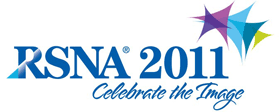
Abstract Archives of the RSNA, 2011
LL-NRS-MO6A
Estimation of Brain Myelination in Multiple Sclerosis Patients Using Quantitative MRI
Scientific Informal (Poster) Presentations
Presented on November 28, 2011
Presented as part of LL-NRS-MO: Neuroradiology
Marcel Warntjes PhD, Presenter: Employee, SyntheticMR AB
Janne West, Abstract Co-Author: Employee, SyntheticMR AB
Olof Dahlqvist-Leinhard, Abstract Co-Author: Nothing to Disclose
Anne-Marie Landtblom, Abstract Co-Author: Nothing to Disclose
Gunther Helms, Abstract Co-Author: Nothing to Disclose
Peter Lundberg PhD, Abstract Co-Author: Co-owner, AMRA AB
Board member, AMRA AB
Stockholder, AMRA AB
To model physical parameters in MRI such as the longitudinal relaxation time T1, the transverse relaxation time T2 and the proton density as the result of signal from coupled tissue components. Each acquisition voxel is considered as a distribution of myelin partial volume V(my), cellular partial volume V(cel) and free water partial volume V(water). Fitting this model to in-vivo T1-T2-PD data results in an estimation of myelination of the brain.
The QRAPMASTER quantification method (Warntjes et al., Magn Reson Med 2008:60;320-329) was used to generate T1, T2, PD maps in a scan time of 8 minutes. For brain coverage 30 slices of 4 mm were acquired with in-plane resolution of 1 mm. Groups of 15 CDMS-patients (age 47(7) years and MRI positive), 9 CDMS-patients (age 55(10) years and MRI negative), and 13 controls (age 47(11) years) were each scanned twice with a 15 minute interval. For each voxel inside the intracranial volume the optimal distribution of V(my), V(cel) and V(water) was found to match the measured combination of T1, T2 and PD. The sum over V(my) corresponds to the total myelin volume, the sum over V(my) and V(cel) to the total brain volume.
According to the model the mean myelin volume was 151(22) mL for the controls, 146(20) mL for the (negMRI) patients and 126(26) mL for the (posMRI) patients. The mean brain volume was 1209(104) mL, 1215(124) mL and 1130(105) mL, respectively. The myelination, the ratio of total myelin over brain volume was 12.5(0.1)%, 12.0(0.1)% and 11.1(0.2)%, respectively. No significant difference was found between the first and the second measurement for these values.
The estimation of brain myelination based on multi-parametric MR quantification, in conjunction with a myelin tissue model, is a promising method for MS patient assessment. The method found that MR positive MS patients have smaller brains with less myelination in comparison with controls.
Quantitative MRI provides a measure of tissue properties which allows estimation of brain myelination for MS patient follow-up.
Warntjes, M,
West, J,
Dahlqvist-Leinhard, O,
Landtblom, A,
Helms, G,
Lundberg, P,
Estimation of Brain Myelination in Multiple Sclerosis Patients Using Quantitative MRI. Radiological Society of North America 2011 Scientific Assembly and Annual Meeting, November 26 - December 2, 2011 ,Chicago IL.
http://archive.rsna.org/2011/11034248.html

